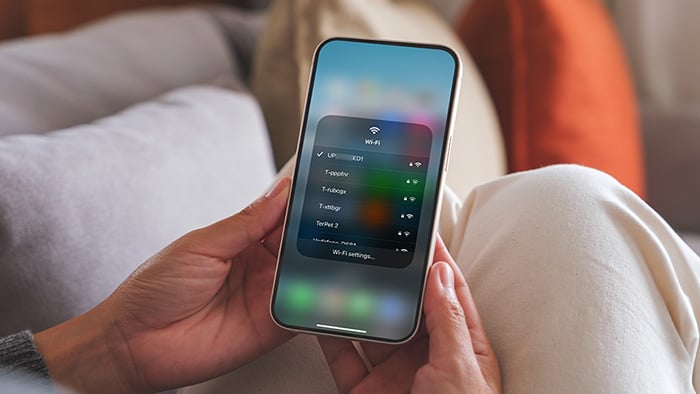What is throttling?
ISP throttling is when your internet service provider (ISP) deliberately restricts your internet bandwidth or speed without telling you. Internet throttling results in speeds slower than what your ISP should be serving you. ISPs use throttling to control internet traffic over their network, reduce bandwidth congestion, and enforce data limits.
Throttling isn’t necessarily bad. If several customers are using the same cell tower, throttling helps equally distribute that bandwidth. Without realizing it, you may have benefited from a throttled internet connection.
Despite pressures on ISPs to inform customers, it’s not always clear if your internet has been throttled. During times of high traffic, ISPs can throttle those they deem “heavy” internet users — but most people don’t fit this criteria.
Slow internet isn’t automatically due to internet throttling. Try speeding up your internet connection yourself or boosting your phone’s internet speed before jumping to conclusions.
Why do ISPs throttle internet?
ISPs throttle the internet mainly to regulate network traffic and clear up network congestion. ISPs can also throttle users when they reach a data usage limit within a fixed period. Throttling gets more questionable when ISPs use it to influence your internet habits and profit off of you.
Here are the most common reasons why ISPs throttle your internet connection:
Data caps
Some ISPs — especially mobile providers — limit the amount of high-speed data you can access every month. If you get near that data cap, you might experience data throttling, resulting in reduced speeds.
ISPs must state any data caps in your service agreement. If you think you’re experiencing ISP throttling, look at your plan and see whether a data cap is the culprit.
Network congestion
When a network becomes crowded with people trying to connect, ISPs use bandwidth throttling to regulate traffic. That way, all customers in a given area can access the network — instead of some getting full access, while others get nothing.
ISPs can also throttle your internet when certain types of data, like large files or torrents, take up too much bandwidth. Your ISP can restrict your bandwidth, even if you already paid for it, simply because your activity is straining their network.
Paid prioritization
Unfortunately, throttling the internet is not always about bandwidth distribution. ISPs can throttle specific websites or applications — like Netflix or Amazon Prime — to discourage you from using them.
That pushes customers toward other streaming services, like the ones affiliated with the ISP, or forces companies to pay more for faster load times for their customers. Those added costs can be passed down to you. In countries without net neutrality, throttling is fair game.
Thankfully, you can fight content-based internet throttling with a VPN — while it can’t hide your overall bandwidth usage, a VPN encrypts your internet traffic, which can prevent ISPs from throttling you based on the sites you visit online.
With Avast SecureLine VPN, you can evade your ISP and push back against throttling, all while enjoying world-class protection and privacy from threats, hackers, and scammers. Try a free 60-day trial today.
How to tell if your internet is being throttled
It’s not always clear if your internet is being throttled — many factors can contribute to slow internet speeds. While there’s no specific internet throttling test, you can use the following techniques to see if your ISP is throttling your connection.
Here’s how to test for ISP throttling:
1. Test internet speed
Testing your internet speed tells you if you’re getting the speed you’re paying for. Internet speed testing tools like the one maintained by Google’s Measurement Lab can calculate your current speed, which you can then compare with your data plan.
Because internet speeds fluctuate, run multiple tests throughout the day and calculate an average. And remember that Wi-Fi connections tend to be slower than Ethernet connections.
/img_01.png?width=450&name=img_01.png) Test your internet connection with a speed test tool.
Test your internet connection with a speed test tool.
Do the tests show that your internet speed is fine, while your computer’s generally slow? It’s possible that you have a system problem on your hands, and not a throttling issue. Try speeding up your PC, streamlining your Mac, or accelerating your iOS device.
2. Run a port scanner test
A port is where your computer (or a program) connects to another computer on the internet, like servers for games or messaging apps. ISPs keep tabs on port activity, and can throttle this data if they see fit.
If you use open ports for gaming, you can use a port scanner to check specific ports for throttling with a variety of scans.
/img_02.png?width=1500&name=img_02.png) Using a port scanner to check for ISP internet throttling.
Using a port scanner to check for ISP internet throttling.
3. Compare your speed with a VPN
A VPN (virtual private network) encrypts your internet connection so you can anonymously surf the web, and it hides your IP address so ISPs can’t track your online activity. VPNs can also help unblock restricted websites.
Fighting internet throttling is another reason why you need to use a VPN to stay safe and secure online.
/VPN_01.png?width=1320&name=VPN_01.png) A VPN encrypts your internet connection so you can browse the web anonymously.
A VPN encrypts your internet connection so you can browse the web anonymously.
After using a speed testing tool to check your internet speed, check it again with a VPN — a slight speed drop when using a VPN is normal. Since a VPN hides your IP address from your ISP, you’ll get an accurate reading of your actual internet speed. If there’s a big difference, your ISP might be throttling data.
While setting up your own personal VPN can be tricky, Avast SecureLine VPN makes it easy. You can download our VPN for Windows or get our VPN for Mac.
In one click, get comprehensive privacy and security with our top-rated VPN. With a secure, encrypted connection, you can conceal your online activity from your ISP, advertisers, hackers and other prying eyes. Enjoy real digital privacy for all your devices today.
How to stop ISP throttling
If you’ve run speed tests and think your ISP is throttling your internet, here are some ways to stop ISP internet throttling:
-
Monitor your monthly data usage. Your ISP is not always at fault for internet speed throttling. If your service plan allots a set amount of data per month, monitor your usage to avoid throttling and overage fees. Avoid heavy data-consuming activities like streaming video, if you can. Or install an app that helps you track data usage.
Although risky in terms of privacy and security, safely connecting to a public Wi-Fi network can also help curb data usage.
-
Switch to a new internet provider. If you're frustrated with your ISP, switch to another if you can. Depending on where you live, there may be other service providers competing for your business. Consider what you need from an ISP and shop around.
Remember: ISPs must tell you about data caps and bandwidth limits. Choose an ISP that serves you, and not the other way around.
-
Use a VPN. If you don’t want to switch providers, a VPN can help you avoid content-based throttling. Your internet speed may drop slightly, but it’s nothing compared to internet throttling. Plus, there are always ways to speed up a VPN.
Note: Avoid using free VPNs. These services are free because of ads or data collection and web tracking. And they usually lack secure protocols. If your aim is to keep your system secure, a free VPN is usually counterproductive.
Is throttling illegal?
Internet throttling is not illegal. You can benefit from throttling when it regulates overburdened networks and helps equally distribute bandwidth among customers. Overall, throttling internet speeds usually results in a more consistent connection for you.
Throttling and net neutrality
Net neutrality laws enable a free and open internet in which ISPs must treat all content and traffic equally. But internet privacy laws vary among countries, and some (like the US) have repealed net neutrality. In those countries, some of the shadier aspects of internet throttling are, by law, legitimate.
-
ISPs can throttle specific kinds of content, which affects what their customers can do online.
-
With throttling, ISPs can also charge higher fees for some internet services, like streaming providers — who may pass on these increased costs to you.
-
By throttling customers on lower-priced plans, ISPs can incentivize people to switch to more expensive data plans.
Net neutrality advocates believe that a free and open internet offers the best opportunities for innovation. When ISPs disregard net neutrality and manipulate the internet for profit, they limit the internet’s ability to grow and create the next best thing.
Bypass throttling with trusted VPN software
While not always bad, internet throttling has considerable downsides. Through throttling, ISPs have the potential to influence what you do online — restricting a free and open internet. Plus, they can deny you the speed you already pay for through your service agreement.
/VPN-02.png?width=900&name=VPN-02.png) Encrypt your connection, protect your privacy, and hide from your ISP with a VPN.
Encrypt your connection, protect your privacy, and hide from your ISP with a VPN.
You can bypass some of the more frustrating aspects of ISP throttling with Avast SecureLine VPN. Our bank-grade encryption technology hides your traffic from your ISP and keeps you safe from hackers, advertisers, and more.
Privately and securely connect to the internet without anyone watching over you. Plus, access all your favorite websites and content at lightning fast speeds around the world. With a free 60-day trial, you can enjoy the internet you deserve today.
/Academy-ISP-internet-throttling-Hero.jpg?width=1200&name=Academy-ISP-internet-throttling-Hero.jpg)
/img_01.png?width=450&name=img_01.png) Test your internet connection with a speed test tool.
Test your internet connection with a speed test tool./img_02.png?width=1500&name=img_02.png) Using a port scanner to check for ISP internet throttling.
Using a port scanner to check for ISP internet throttling./VPN_01.png?width=1320&name=VPN_01.png) A VPN encrypts your internet connection so you can browse the web anonymously.
A VPN encrypts your internet connection so you can browse the web anonymously./VPN-02.png?width=900&name=VPN-02.png) Encrypt your connection, protect your privacy, and hide from your ISP with a VPN.
Encrypt your connection, protect your privacy, and hide from your ISP with a VPN.










